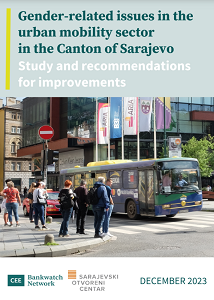Gender-Related Issues in the Urban Mobility Sector in the Canton of Sarajevo – Study and Recommendations for Improvements
Gender-Related Issues in the Urban Mobility Sector in the Canton of Sarajevo – Study and Recommendations for Improvements
Author(s): Amina Dizdar
Subject(s): Politics, Gender Studies, Sociology, Social differentiation, Rural and urban sociology, Social Norms / Social Control, Transport / Logistics
Published by: Sarajevo Open Centre
Keywords: Urban environments; Sarajevo BiH; gender; issues; recommendations; improvements;
Summary/Abstract: Sarajevo’s urban transport system, once advanced but then devastated during the war, has been patched up to serve its users. However, the increased use of motor vehicles, inadequate public transport, and environmental concerns have led to dissatisfaction, with heavy traffic during rush hours and reliability issues within the system. The Canton of Sarajevo has significant decision-making power over urban mobility, focusing on sustainable development and aligning its initiatives with the EU Energy Strategy 2030 and sustainable development goals (SDGs). Despite the efforts outlined in the Sustainable Urban Mobility Plan (SUMP), gender equality is inadequately addressed, and broader issues such as long wait times and travel distances are overlooked, impacting women’s experiences and necessitating a more inclusive urban planning approach. The plan also overlooks the urgent need for gender-sensitive public transport to enhance women’s mobility and autonomy. The Canton of Sarajevo’s Gender Action Plan (GAP) also falls short in recognising and addressing gender gaps in traffic and urban mobility. A survey undertaken by the Sarajevo Open Centre in September 2023, with the aim of understanding issues faced by women, was answered by 213 women from the Canton of Sarajevo aged predominantly 35 to 50. The survey included questions on safety and accessibility for mothers, pregnant women, and older women and offered a worrisome view of the vulnerability of women and of gender disparity, both of which as yet remain unaddressed. Expensive tickets in Bosnia and Herzegovina disproportionately affect those families with a single working member and multiple children. Daily public transport use by women is common (49.8 per cent), with 52.6 per cent needing multiple transport modes within a single day. Women usually spend BAM 50 to 70 (EUR 25 to 35) on tickets per month (22.5 per cent). Public transport significantly impacts daily life decisions related to economic opportunities and safety. A significant number of the women surveyed had experienced violence and generally felt unsafe using public transport, particularly female workers working night shifts. Despite high rates of harassment, official statistics are lacking, and 93 per cent of women feel that public transport lacks clear information on reporting and preventing incidents. However, there are existing practices that can be seen as models, such as those used in Vienna, London and Madrid, which – in synergy with practical mechanisms to enforce gender considerations in public transportation projects by local authorities and with financial institutions providing loans – could offer high-quality public transport that addresses these gender-specific disparities and improves women’s overall mobility and autonomy.
- Page Count: 21
- Publication Year: 2023
- Language: English
- Content File-PDF

